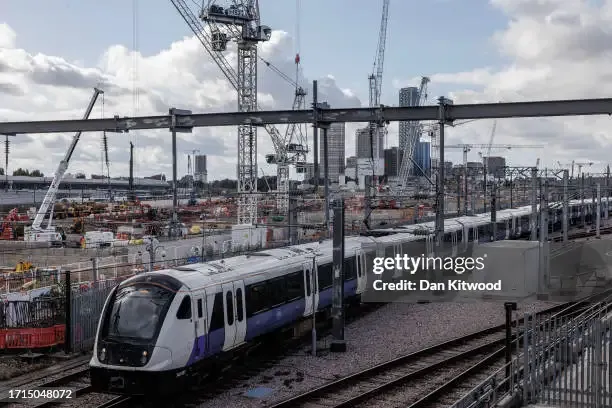Transport secretary Louise Haigh has admitted that the costs of HS2 continue to spiral as she announced plans to “get the project back under control” with another independent review, say Jim Pickard and Gill Plimmer in the Financial Times. The original cost of the Y-shaped rail line, intended to link London to Manchester and Leeds, had “ballooned” from £37.5 billion in 2009 to more than £70 billion by the time Boris Johnson axed the eastern leg in 2021, says The Sunday Times.
When Rishi Sunak severed the western line in 2023, some cost estimates had jumped to £100bn. Even after having “shed most of its sections”, one estimate puts completion costs at £67 billion, which will leave us with a 135-mile-long line dubbed the “Acton to Aston shuttle”, says Christian Wolmar in The Spectator. Starting five miles from central London, it will terminate a mile from Birmingham New Street station, “necessitating a tram ride”. Since it will be more expensive and won’t save any time, few people will use it.
Additionally, it is unlikely to open until at least 2033 instead of the mid-2020s. Haigh wants to know “what the hell has gone wrong”, says Nils Pratley in The Guardian. The “most significant chunk” of cost overruns relates to the 2018 decision to award cost-plus contracts, where the contractor is paid a “percentage of the total value of the work”. As Sir Jon Thompson, who was appointed chair of HS2 Ltd in early 2023, points out, this places 99% of the financial risk with the government (“extraordinary”) and incentivises budget overruns. The one-sided contracts came about after Carillion went bust in 2018 and ministers were desperate for contractors to bid for the work. With the chances of recouping cash for completed work slim, penalties will apply to future work.
Sign up to Money Morning
Don’t miss the latest investment and personal finances news, market analysis, plus money-saving tips with our free twice-daily newsletter
Don’t miss the latest investment and personal finances news, market analysis, plus money-saving tips with our free twice-daily newsletter
A HS2 scandal
The Institution of Civil Engineers blames the “absence of a guiding mind”, says The Times. HS2 has “had to navigate” six prime ministers, eight chancellors and nine transport secretaries. HS2 Ltd itself has “churned through five chief executives and seven chairmen”. Whistle-blowers were allegedly “ignored or sacked”. “Several wrong decisions” were made at the outset, adds Wolmar: building the fastest railway in the world in a small country, building it to an incompatible European gauge, and not using proven, cheaper building techniques. Nor are these problems unique to HS2, says The Sunday Times. It is “emblematic” of our “inability to complete big infrastructure projects” and provides an “object lesson in why Britain struggles to escape its doom loop of anaemic growth”.
Defence procurement is also “infamously sloppy” and progress on nuclear has stalled, with extra billions having to be set aside for Sizewell C. Can anything be salvaged from the mess? Reviving the section between Birmingham and Manchester makes sense. It would be the cheapest section to build and the most beneficial in terms of transport links, says Wolmar. A consortium of contractors has put forward a proposal for “HS2-light”, involving private-sector investment, but it would still cost billions, and Haigh, who is “delighting” in the “renationalisation” of the railways, may not be keen.
The Department for Transport has said it won’t be “resurrecting” the plan to connect the West Midlands with Manchester, say Gabriel Pound and Caroline Wheeler in The Sunday Times. Ministers are, however, “actively considering” extending the line to London’s Euston, as originally planned. That a group of “Pollyanna-ish politicians, low-grade civil servants and profiteering contractors” should have been allowed to “humiliate Britain” is a scandal, says The Sunday Times. “It cannot be allowed to happen again.”
This article was first published in MoneyWeek’s magazine. Enjoy exclusive early access to news, opinion and analysis from our team of financial experts with a MoneyWeek subscription.
